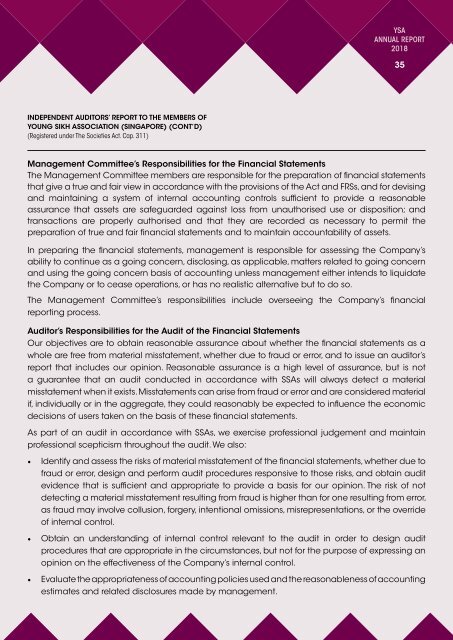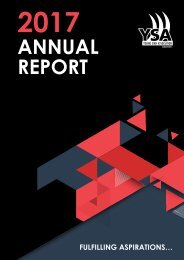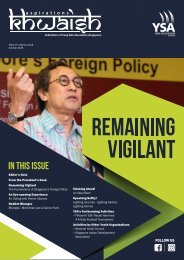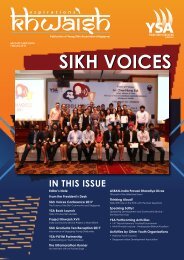YSA Annual Report 2018
Create successful ePaper yourself
Turn your PDF publications into a flip-book with our unique Google optimized e-Paper software.
<strong>YSA</strong><br />
ANNUAL REPORT<br />
<strong>2018</strong><br />
35<br />
INDEPENDENT AUDITORS’ REPORT TO THE MEMBERS OF<br />
YOUNG SIKH ASSOCIATION (SINGAPORE) (CONT’D)<br />
(Registered under The Societies Act. Cap. 311)<br />
Management Committee’s Responsibilities for the Financial Statements<br />
The Management Committee members are responsible for the preparation of financial statements<br />
that give a true and fair view in accordance with the provisions of the Act and FRSs, and for devising<br />
and maintaining a system of internal accounting controls sufficient to provide a reasonable<br />
assurance that assets are safeguarded against loss from unauthorised use or disposition; and<br />
transactions are properly authorised and that they are recorded as necessary to permit the<br />
preparation of true and fair financial statements and to maintain accountability of assets.<br />
In preparing the financial statements, management is responsible for assessing the Company’s<br />
ability to continue as a going concern, disclosing, as applicable, matters related to going concern<br />
and using the going concern basis of accounting unless management either intends to liquidate<br />
the Company or to cease operations, or has no realistic alternative but to do so.<br />
The Management Committee’s responsibilities include overseeing the Company’s financial<br />
reporting process.<br />
Auditor’s Responsibilities for the Audit of the Financial Statements<br />
Our objectives are to obtain reasonable assurance about whether the financial statements as a<br />
whole are free from material misstatement, whether due to fraud or error, and to issue an auditor’s<br />
report that includes our opinion. Reasonable assurance is a high level of assurance, but is not<br />
a guarantee that an audit conducted in accordance with SSAs will always detect a material<br />
misstatement when it exists. Misstatements can arise from fraud or error and are considered material<br />
if, individually or in the aggregate, they could reasonably be expected to influence the economic<br />
decisions of users taken on the basis of these financial statements.<br />
As part of an audit in accordance with SSAs, we exercise professional judgement and maintain<br />
professional scepticism throughout the audit. We also:<br />
• Identify and assess the risks of material misstatement of the financial statements, whether due to<br />
fraud or error, design and perform audit procedures responsive to those risks, and obtain audit<br />
evidence that is sufficient and appropriate to provide a basis for our opinion. The risk of not<br />
detecting a material misstatement resulting from fraud is higher than for one resulting from error,<br />
as fraud may involve collusion, forgery, intentional omissions, misrepresentations, or the override<br />
of internal control.<br />
• Obtain an understanding of internal control relevant to the audit in order to design audit<br />
procedures that are appropriate in the circumstances, but not for the purpose of expressing an<br />
opinion on the effectiveness of the Company’s internal control.<br />
• Evaluate the appropriateness of accounting policies used and the reasonableness of accounting<br />
estimates and related disclosures made by management.






